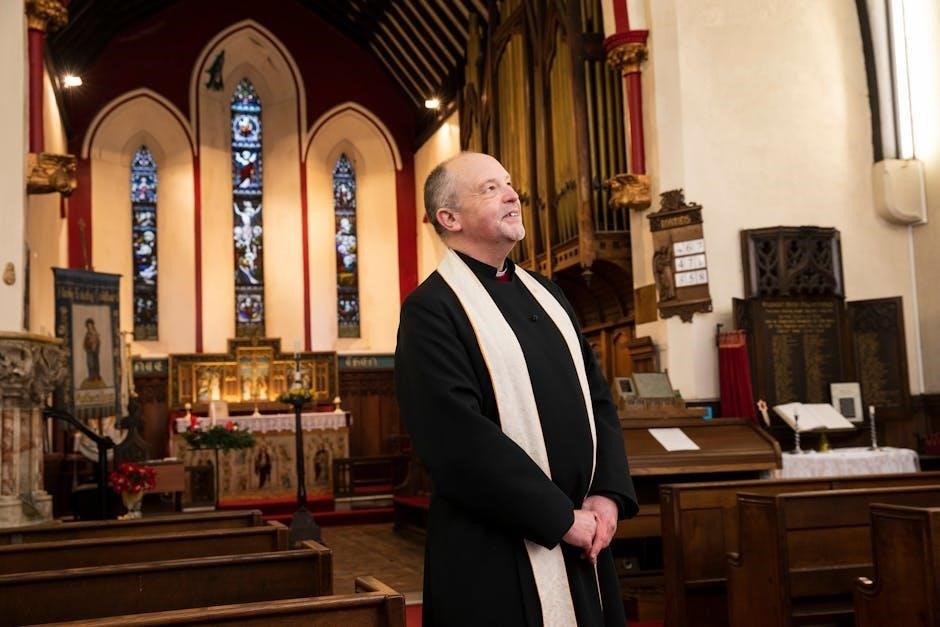Non-denominational church bylaws provide a legal and governance framework, ensuring structure, accountability, and clarity in operations for independent churches, separate from denominational oversight․
1․1 Definition and Purpose of Bylaws
Bylaws are formal rules governing a church’s internal operations, ensuring orderly governance and accountability․ They define roles, responsibilities, and procedures, providing clarity and structure for decision-making․ The purpose of bylaws is to establish a legal framework that aligns with the church’s mission and values, ensuring compliance with non-profit regulations and maintaining tax-exempt status․ They also outline membership requirements, leadership roles, and financial management processes, serving as a foundational document for the church’s functioning and growth․
1․2 Importance of Bylaws in Church Governance
Bylaws are essential for effective church governance, providing clear guidelines that ensure accountability, transparency, and continuity․ They protect the church’s integrity by outlining roles, responsibilities, and decision-making processes․ Bylaws also safeguard the church’s legal and financial interests, ensuring compliance with non-profit regulations․ Additionally, they foster unity by establishing a shared understanding of the church’s mission, values, and operational standards, which are crucial for maintaining trust and harmony among members․
Structure and Key Components of Non-Denominational Church Bylaws
Non-denominational church bylaws typically include Articles of Incorporation, a Statement of Faith, membership requirements, leadership roles, financial management, and accountability measures to ensure operational clarity and legal compliance․
2․1 Articles of Incorporation
The Articles of Incorporation establish the church’s legal identity, outlining its name, purpose, and non-profit status․ This document typically includes the church’s mission, governance structure, and compliance with state laws․ It serves as the foundational legal document, ensuring the church operates as a recognized non-profit entity․ The articles also define the church’s autonomy and independence from denominational control, providing a clear framework for its organizational and operational integrity․
2․2 Statement of Faith
The Statement of Faith outlines the church’s core beliefs and doctrines, serving as a spiritual foundation․ It typically includes teachings on the Bible’s authority, the Trinity, salvation through Jesus Christ, baptism, and the church’s mission․ This document ensures unity among members and leaders, guiding the church’s ministries and decisions․ It reflects the church’s commitment to evangelical principles while maintaining its non-denominational identity․
2․3 Membership Requirements and Procedures
Membership in a non-denominational church typically requires a confession of faith in Jesus Christ, baptism by immersion, and agreement with the church’s statement of faith․ Procedures often include attending orientation, completing an application, and receiving approval from church leadership․ Active participation in church life is expected, while inactive members may face reinstatement processes to maintain their status within the congregation․
2․4 Leadership and Governance Structure
Non-denominational churches typically operate under an Elder Board or similar governing body, ensuring spiritual oversight and operational guidance․ Leaders, including pastors and elders, are chosen based on biblical qualifications and church-specific criteria․ Their roles involve teaching, decision-making, and discipling the congregation․ This structure emphasizes autonomy, allowing the church to self-govern while maintaining accountability to its members and adhering to biblical principles․
2․5 Financial Management and Accountability
Non-denominational churches must establish clear financial policies to ensure transparency and integrity; This includes budgeting, expense tracking, and regular audits to maintain accountability․ Leaders are responsible for managing funds ethically, with decisions made collectively to align with the church’s mission․ Financial reports are typically shared with members to build trust and ensure compliance with non-profit regulations, fostering a culture of stewardship and responsibility․
Membership and Attendance Policies
Membership policies outline eligibility, rights, and responsibilities, ensuring a structured community․ Attendance policies promote engagement, with procedures for inactive status and reinstatement, balancing inclusion and accountability effectively within the church․
3․1 Eligibility Criteria for Membership
Membership eligibility typically requires a confession of faith in Jesus Christ, baptism by immersion, and acceptance of the church’s statement of faith․ Applicants must align with the church’s doctrinal beliefs and values․ Some churches may also require completion of a membership class or interview with church leaders․ These criteria ensure unity and commitment among members, fostering a vibrant, like-minded community dedicated to shared spiritual goals and practices․
3․2 Rights and Responsibilities of Members
Members have the right to vote on key decisions, participate in meetings, and engage in church ministries․ They are responsible for attending services, supporting the church financially, and upholding its values․ Members are expected to maintain a commitment to the church’s mission, participate in communal life, and adhere to biblical principles․ These mutual obligations foster a united and purposeful church community, ensuring spiritual growth and collective accountability․
3․3 Inactive Membership Status and Reinstatement
Membership may become inactive due to prolonged absence or lack of participation․ Inactive members retain limited rights but cannot vote or hold leadership roles․ Reinstatement requires a formal request, demonstrating renewed commitment to the church’s mission and values․ The leadership reviews such requests, ensuring adherence to bylaws and biblical principles before restoring active status and full membership privileges․

Leadership Roles and Responsibilities
Leaders, including elders, pastors, and ministry heads, oversee spiritual guidance, strategic vision, and operational oversight, ensuring alignment with the church’s mission and values while supporting the congregation․
4․1 Roles of Elders, Pastors, and Other Leaders
Elders and pastors provide spiritual guidance, preach, and oversee congregational care, while other leaders manage administrative and ministry tasks․ Elders often focus on governance and disciplinary matters, ensuring doctrinal integrity․ Pastors prioritize teaching, counseling, and community outreach․ Together, they collaborate to maintain unity, foster discipleship, and uphold the church’s mission, ensuring accountability and alignment with its values and purpose․
4․2 Decision-Making Processes and Authority
Decisions are typically made by a majority vote of eligible leaders, ensuring collective accountability․ Elders and pastors often lead discussions, while final authority rests with the leadership team․ Key decisions, such as budget approvals or major policy changes, may require a quorum and advance notice․ This structured approach ensures transparency, aligns with the church’s mission, and maintains unity among members and leaders․

Financial Management and Accountability
Churches must maintain transparent financial practices, ensuring all funds are used for charitable, educational, and religious purposes․ Regular audits and compliance with non-profit regulations are essential․
5․1 Budgeting and Fiscal Responsibility
The church must establish a budgeting process to ensure responsible allocation of funds․ Annual budgets should align with the church’s mission and be approved by the leadership․ Financial oversight, including regular reporting and audits, ensures transparency and accountability․ Proper management of reserves and expenses is crucial to maintain fiscal integrity and compliance with non-profit regulations, safeguarding the church’s mission and trust of its members․
5․2 Transparency in Financial Reporting
Transparency in financial reporting is essential for fostering trust and accountability․ Churches must provide clear, accurate, and timely financial statements to members and stakeholders․ Regular audits and open disclosure of budget allocations ensure integrity․ Financial reports should be accessible, detailing income, expenses, and reserves․ This practice upholds accountability, builds member confidence, and demonstrates responsible stewardship of resources, aligning with biblical principles of faithfulness and integrity in managing God’s resources․

Amendments and Updates to Bylaws
Amendments to bylaws ensure the document remains relevant and compliant with legal standards, allowing the church to adapt to changing needs and circumstances effectively through regular reviews and updates, ensuring continued alignment with the church’s mission and values․
6․1 Process for Revising Bylaws
The process for revising bylaws typically involves a proposal from church leadership or members, followed by review and discussion․ Changes are voted on, often requiring a majority or supermajority approval․ Approved amendments are then documented and communicated to the membership, ensuring transparency and adherence to the church’s governance structure․ This process maintains the bylaws’ relevance and alignment with the church’s mission and legal requirements․
6․2 Approval and Implementation of Changes
Approved changes to the bylaws are documented and officially recorded․ The updated bylaws are shared with the membership, ensuring transparency․ Leadership oversees the implementation, guiding the church through any necessary adjustments․ The effective date of the changes is communicated, and all relevant documents are updated to reflect the new bylaws, maintaining continuity in church governance and operations․
Legal Compliance and Best Practices
Non-denominational churches must adhere to non-profit regulations and maintain tax-exempt status․ Compliance with local, state, and federal laws ensures operational integrity and public trust, guiding ethical governance․
7․1 Adherence to Non-Profit Regulations
Non-denominational churches must comply with non-profit laws, ensuring financial transparency and governance accountability․ Adherence to these regulations maintains tax-exempt status and public trust, while avoiding legal penalties․ Proper documentation, annual reporting, and ethical practices are essential․ Churches must operate exclusively for charitable, educational, or religious purposes, with no private benefit to individuals․ Compliance ensures sustainability and integrity in fulfilling their mission and community impact effectively․
7․2 Ensuring Tax-Exempt Status
Maintaining tax-exempt status is crucial for non-denominational churches․ This requires adhering to IRS regulations, ensuring activities align with religious, educational, or charitable purposes․ Churches must avoid political campaigning and substantial lobbying․ Annual reporting, such as filing Form 990, and maintaining clear financial records are essential; Compliance ensures continued tax benefits and public trust, while non-compliance risks losing exempt status and facing legal consequences․
Examples and Templates for Non-Denominational Church Bylaws
Downloadable templates and sample bylaws provide customizable frameworks, enabling churches to adapt governance documents to their unique needs while ensuring legal and structural integrity․
8․1 Sample Bylaws for Reference
Sample bylaws for non-denominational churches often include sections on membership criteria, leadership roles, financial procedures, meeting protocols, and amendment processes․ These documents serve as templates, allowing churches to adapt them to their specific needs while maintaining legal and organizational integrity․ They typically outline governance structures, ensuring clarity and consistency in church operations․ Downloadable samples provide practical frameworks for drafting comprehensive bylaws tailored to individual church requirements․
8․2 Customizing Templates for Specific Needs
Churches can adapt bylaws templates to reflect their unique mission, values, and operational requirements․ This ensures alignment with their specific beliefs and practices․ Customization may involve adding clauses on leadership roles, financial policies, or membership criteria․ By tailoring templates, churches can create comprehensive bylaws that address their particular needs while maintaining legal and organizational integrity․ This step is crucial for ensuring relevance and effectiveness in governance․
Non-denominational church bylaws are essential for establishing clear governance, ensuring accountability, and maintaining tax-exempt status, while guiding the church’s mission and operations effectively․
9․1 Summary of Key Points
Non-denominational church bylaws establish governance frameworks, defining membership, leadership roles, financial practices, and legal compliance․ They ensure accountability, protect tax-exempt status, and guide operations, fostering unity and clarity in achieving the church’s mission while maintaining autonomy and integrity in all activities․
9․2 Final Thoughts on Effective Bylaws Implementation
Effective implementation of non-denominational church bylaws requires clear communication, consistent enforcement, and regular reviews to adapt to changing needs․ Churches should prioritize transparency, involve members in decision-making, and ensure leaders are trained to uphold governance standards․ Bylaws are not static documents but tools to safeguard the church’s mission, fostering unity and accountability while allowing flexibility for growth and ministry impact․